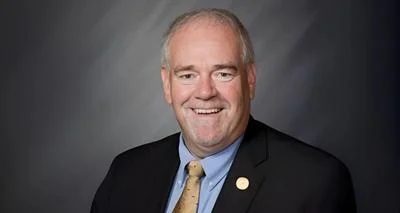Senator Todd Young, US Senator for Indiana | Official U.S. Senate headshot
Senator Todd Young, US Senator for Indiana | Official U.S. Senate headshot
U.S. Senators Todd Young and Dick Durbin announced that their Congenital Heart Futures Reauthorization Act has been signed into law. This legislation aims to extend funding for public health initiatives at the Centers for Disease Control and Prevention (CDC) to enhance survival rates, prevent premature death and disability, and improve the quality of life for the 2.5 million Americans living with congenital heart disease (CHD). According to statistics, heart defects are the most common form of birth defects, occurring every 15 minutes.
Senator Young expressed his satisfaction with the bill becoming law, stating, “This reauthorization will continue to encourage research and data collection that will help improve the care offered to those with CHD.” Senator Durbin highlighted improvements in screening and surgeries for children born with heart defects: “Thanks to President Biden, Senator Young, and colleagues in the House, we worked in a bipartisan way to get this done.”
The act specifically reauthorizes CDC’s surveillance systems to track epidemiology among children born with CHD and gather longitudinal patient data as they age. It also supports awareness-building activities aimed at educating both patients and medical communities about CHD. Additionally, it directs the Secretary of Health and Human Services to convene a workshop of experts to assess research gaps and workforce capacity for adult CHD patients.
In 2018, Senators Young and Durbin led efforts to expand CDC’s CHD program scope by gathering epidemiological data on patients across their lifespan. The reauthorization promoted awareness efforts due to many adults being unaware they require specialized care; fewer than 10 percent currently receive recommended care.
Pediatric hospitalizations for CHD cost $9.8 billion annually. While early detection can be lifesaving—an estimated 80 percent of youth with CHD now survive at least 35 years—there is no cure. Adult survivors require lifelong specialized care as they face increased risks of disability, co-morbidities, and premature death.
The act has garnered support from several organizations including the Adult Congenital Heart Association (ACHA), Conquering CHD, American Heart Association, American Academy of Pediatrics, Children’s Hospital Association, American College of Cardiology, Society for Thoracic Surgeons, National Down Syndrome Society, Children’s Heart Foundation, and Mended Little Hearts.
Mark Roeder from ACHA noted excitement about provisions addressing workforce shortages in adult CHD care: “We applaud Senators Durbin and Young for developing this bipartisan solution.” Carissa Ostrom from Conquering CHD described it as a major step forward: “By continuing to champion these efforts...we can foster hope for future generations.” Leah Evangelista from Children’s Hospital Association emphasized early identification's importance: “Children’s hospitals are committed...to driving innovation in diagnosis.”






 Alerts Sign-up
Alerts Sign-up